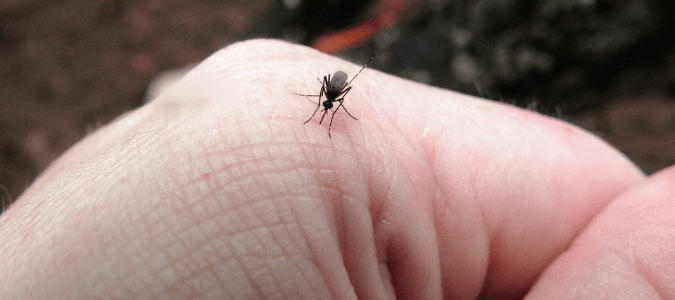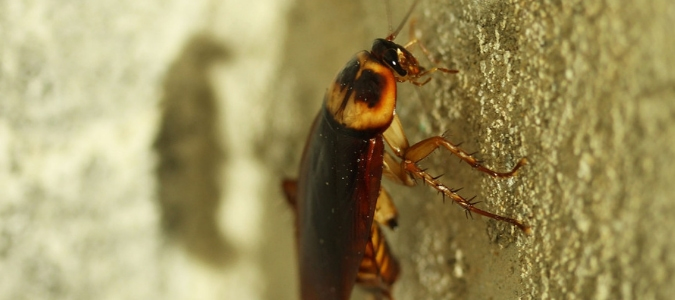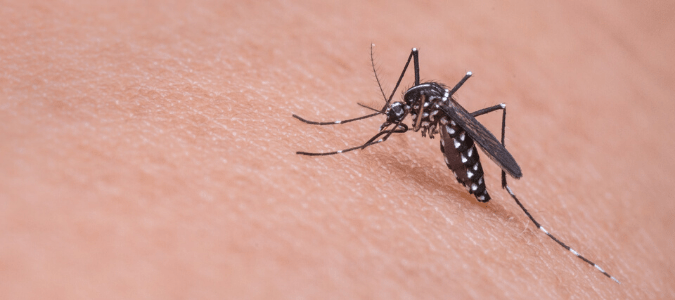Mosquito Versus Spider Bites

How to Identify a Mosquito Bite
The term “mosquito bite” is actually misleading. Mosquitoes are small, flying insects that come out in warmer weather and suck the blood of humans and other animals. Male mosquitoes don’t actually bite people, however. They feed on flower and plant nectars.
Only female mosquitoes bite people—and they don’t technically bite. They use their straw-like mouth to create a tiny incision in our skin and then suck out the blood. Mosquitoes don’t do this for their own nutritional needs. They do it for the proteins found in animal blood. They need these proteins for their eggs, to help them develop properly.
When it’s cold outside, mosquitoes either die off or hibernate through the winter. They become active again during warmer months, starting when nighttime temperatures are regularly above 50 degrees. This is called mosquito season. It’s also when mosquitoes begin breeding again. Here in Central Texas, mosquito season can last nearly all year long.
Mosquito bites don’t bother everyone. Some people can spend time outside during mosquito season without having to slap constantly at these annoying pests. For most of us, though, mosquito bites cause red welts on the skin that are very itchy. Some people are even more reactive to mosquito bites and may experience hives as an allergic reaction to the bites.
Mosquito bites are found mostly on exposed skin—any skin that mosquitoes can easily reach. They do seem to like biting people on their hands and ankles especially, though. You may or may not feel the mosquito biting you in the moment, but there’s a good chance you will feel the bite after the fact. It may be itchy for several days.
How to Identify Spider Bites
Like mosquito bites, spider bites can cause red welts. But these bites are less likely to be itchy, and more likely to be painful. They might also have visible dots in the center of the welt at the exact spot of the bite. The spot may turn into a blister. It may also seep fluid or turn crusty. Mosquito bites rarely do this unless scratching them too much breaks the skin and causes a secondary infection.
Some spider bites develop painful red rings or splotches around the bite site. These can be a sign of spreading infection. Depending on the type of spider that bit you, the bite may be serious. Bites from spiders like brown recluses or black widows often need medical attention. These spiders’ bites can cause more symptoms besides just the painful bite itself. They can cause headaches, fever, swollen glands, muscle cramps and breathing trouble.
If you have what may be a spider bite and you’re experiencing any of these more serious symptoms, it’s important to contact your doctor as soon as possible. Without proper treatment, a serious spider bite can turn into a major infection. The skin and flesh around the bite might even be severely damaged. It’s very important to get medical attention quickly.
How to Reduce Mosquito and Spider Bites
A single mosquito can bite you more than once. These pests often fly in groups, so many mosquitoes may bite you at the same time. If you spend more than a few minutes outside when these pests are active, you’re likely to get multiple bites. Spiders, on the other hand, usually bite someone only once or twice. This is another way to tell mosquito vs. spider bites apart.
If it’s mosquito season, chances are good mosquitoes will bite during the day. Unfortunately, there are many different types of mosquitoes that are active at various times of the day. This means there may not be any “safe” time of day to spend time outside without being bitten. To reduce bites, you’ll need to use mosquito repellent. Wearing long pants and sleeves will also help protect your skin.
There are also several steps you can take to make your yard less attractive to mosquitoes. Since these pests breed in standing water, be sure to dump out any water left in pots, kids’ toys and bird baths after rain, or after running the sprinklers. Many homeowners notice an uptick in mosquitoes after rain. Mowing the lawn and keeping the landscaping trimmed also helps reduce mosquito populations. So does resolving drainage issues in low areas of the yard.
If there’s an uptick in spider activity around your home or yard, it likely means you have another pest problem as well. Spiders eat bugs and insects. When there are more spiders around, it means there are more bugs and insects around for spiders to eat.
Contacting a pest control professional is the best way to resolve pest problems you may be dealing with. Mosquitoes, spiders and other pests don’t stand a chance against treatments administered by a trained pest control professional.

Do Spiders Eat Roaches?
If you have a roach problem in your home, you may wonder about natural pest control. There are certain insects that eat other insect pests. Do spiders eat roaches? If you have both spiders and roaches, can the spiders help keep the roaches at bay? These are questions many people ask of pest control professionals. Let’s dig into the answers.
The simple answer is that several types of spiders do eat roaches if they get the chance. American house spiders, wolf spiders, huntsman spiders, jumping spiders and running spiders all eat roaches. So do brown recluses and black widows—though these are both dangerous spiders for humans to be around, so they are not spiders you want in your home.
Most people don’t want any spiders in their homes, regardless of what kind they are. Furthermore, while spiders can eat roaches, they can’t eat enough to be effective pest control against other pests. If you have spiders in your home, it can only be because you have another pest problem—whether that is roaches, ants, earwigs or some other pest that spiders like to feed on.
Any pest infestation in the home should be treated immediately. Pests in the home can be unsafe for people and pets in a variety of ways. Many pests, like mosquitoes and roaches, can carry bacteria or diseases that make people sick. Others, like termites and certain ants, can cause property damage that is difficult and expensive to fix.
The best way to deal with a pest infestation is to enlist help from a pest control professional. A pro has access to the best products and techniques to treat the problem from all angles. That way, you’ll be able to relax in your home, knowing you’re protected from the many different problems that insect pests can cause.

What Kind of Birds Eat Mosquitoes?
Many people wonder what kind of birds eat mosquitoes. Birds do feed on insects, including flying insects, and mosquitoes are annoying pests. They can carry and transmit diseases, and their bites are itchy and annoying at best. Several types of birds do eat mosquitoes. These include nighthawks, house wrens, hummingbirds and Baltimore orioles. Purple martins, Eastern bluebirds, yellow warblers and downy woodpeckers also eat mosquitoes.
Even if you have one or more of these types of birds in your yard, you could still have an ongoing mosquito problem. Birds are not an effective form of mosquito control. This is because they simply can’t eat enough mosquitoes to keep pest populations down. This is especially true if there’s a heavy mosquito infestation in your yard.
Still, birds can be very pleasant to have around. Lots of people enjoy birdwatching, and birds can make at least a small dent in pest populations around your yard. You can make your property more bird-friendly by following a few simple steps:
- Plant native flowering plants in your garden to increase the number of food sources for different types of birds. Native plants can support bird populations by supplying nuts, seeds, fruits and nectars. They can also harbor caterpillars and insects that birds feed on as well.
- As much as possible, avoid using chemical or synthetic pesticides in your yard that could harm birds. This may mean having to accept that a bird-friendly yard is one with plenty of different insects that birds eat. These might include species that most people consider to be pests.
- Rake as little as possible, too. Birds use fallen debris from bushes and trees to build their nests. The insects that serve as bird food also use plant debris for breeding, feeding and other purposes.
Birds can’t be relied on for pest control, but a licensed pest control professional can develop a customized plan for your yard that will control mosquitoes while protecting the birds that feed on them.
Chem-free Can Reduce Mosquito and Spider Populations on Your Property
Mosquitoes and spiders can make you miserable. Instead of dealing with obnoxious bites, contact Chem-free Pest Control. We offer holistic methods of pest control that have your family in mind. This way, you can feel comfortable at home again.
Need Help Managing Pests?
Chem-Free offers both effective, low-impact pest control options and preventative measures to help avoid future infestations. Contact us today for a free estimate!


